10 Best Herbs for Kidney Cleanse: Boost Your Kidney Function

Did you know that your kidneys are fundamental to flushing out waste and toxins from your bloodstream?
It’s vital to support these hardworking organs, and maintaining your kidney health is super important.
It’s a widely believed that using specific herbs and plants can support kidney function. While scientific evidence on the effectiveness of these herbs is limited, in this article I am going to listing the top 10 herbs for kidney cleanse and detoxification, based on experts, herbalists and the scientific evidence I could find.
But first, why our kidneys is such an important part of our bodies..
Understanding Kidney Function
Your kidneys are vital to your overall health, performing several critical functions to keep your body in balance.
Here’s what they do:
- Filtering Fluids: According to the National Kidney Foundation, each day, your kidneys filter about 200 quarts of fluid. This process helps remove waste products like urea, creatinine, and acids from your bloodstream, ensuring that these substances don’t build up to harmful levels in your body.
- Blood and Waste Separation: After your kidneys have done their filtering work, the clean blood returns to your bloodstream. Meanwhile, the waste they’ve collected gets sent to your bladder and leaves your body as urine, helping to keep your internal environment clean and balanced.
- Regulating Essential Functions: Beyond filtering, your kidneys are multitasking powerhouses. They control the acid-base balance of your body, produce sugar when your blood sugar is low, and regulate blood pressure through the production of renin. They also create vital hormones like calcitriol, which helps regulate calcium absorption, and erythropoietin, which signals your body to make red blood cells.
Best Herbs For Kidney Disease
- Juniper berries (Juniperus communis).
1. Juniper berries (Juniperus communis)

Juniper berries, known scientifically as Juniperus communis, are unique in that they’re not true berries but rather small cones resembling those from pine trees.
These berries are part of the Cypress Family and have a long history of use in traditional medicine for a variety of ailments. Here’s how they can support kidney health:
- Kidney and Urinary Tract Support: Juniper berries may help increase urine volume due to their volatile oils, especially terpinen-4-ol. This effect can be beneficial for reducing edema and flushing out bacteria from the urinary tract, which might be helpful for those with urinary tract infections (UTIs).
- Purifying Properties: Cultures such as the Chinese, American Indians, and Europeans have traditionally used juniper berries as a blood-purifying tonic. They are also utilized for their potential benefits in conditions like arthritis, gout, and rheumatism, as well as for their support in chronic kidney and urinary tract issues.
- Anti-inflammatory and Diuretic Effects: The monoterpenes and sesquiterpenes found in juniper berries exhibit anti-inflammatory effects and significant diuretic activity. Such properties can aid in reducing inflammation and promoting the elimination of excess fluids from the body.
When incorporating juniper berries into a kidney cleanse, start with a moderate amount and gradually increase the dose, avoid prolonged use to prevent kidney overstimulation, and consider combining them with other cleansing herbs like How Celandine helps with Kidney Cleanse?, Dandelion, Burdock root, and Cleavers for a more comprehensive cleanse.
2. Celandine (Chelidonium majus)

Celandine, also known as Chelidonium majus, is a medicinal herb that has been used for centuries for its health benefits.
Here’s how celandine may help with kidney cleanse:
- Diuretic properties: Celandine is known to have diuretic properties, which means it can increase urine production and promote the elimination of waste products from the body. [1] By increasing urine output, celandine may help flush out toxins and impurities from the kidneys, supporting their cleansing process.
- Anti-inflammatory effects: Inflammation in the kidneys can impair their function and contribute to the development of kidney diseases. Celandine contains compounds that have been found to possess anti-inflammatory properties. [2]
- Antioxidant activity: Oxidative stress, caused by an imbalance between free radicals and antioxidants in the body, can damage the kidneys and lead to various kidney disorders. Celandine is rich in antioxidants, which can help neutralize free radicals and protect the kidneys from oxidative damage.
- Detoxification support: Celandine is believed to have detoxifying properties that can aid in the removal of harmful substances from the kidneys. It is thought to enhance the detoxification process by supporting the liver, which is closely connected to kidney function.
- Antimicrobial effects: Celandine has been found to exhibit antimicrobial activity against certain bacteria and fungi. [3] Kidney infections, such as urinary tract infections, can negatively impact kidney health. The antimicrobial properties of celandine may help combat these infections and promote a healthy environment in the kidneys.
In summary, celandine may help with kidney cleanse through its diuretic properties, anti-inflammatory effects, antioxidant activity, detoxification support, and antimicrobial effects.
3. Burdock Root

Burdock root is gaining attention for its potential in supporting kidney health. Here’s how you can consider integrating this herb into your kidney cleanse routine:
- Diuretic Properties: Known for increasing urine output, burdock root helps to flush out excess fluids and waste from the body. This can be particularly beneficial if you’re looking for ways on how to detox kidneys and maintain optimal kidney function.
- Antioxidative Benefits: With antioxidants like quercetin and luteolin, burdock root combats free radicals, reducing oxidative stress which is vital for healthy kidneys. These properties may also be helpful if you’re tracking signs that a kidney detox is working, as reduced oxidative stress can indicate improved kidney health.
- Prebiotic Fiber: The inulin content in burdock root supports gut health, which is closely linked to kidney function. A healthy digestive system can contribute to better overall kidney health.
When incorporating burdock root into your diet, here are some practical tips:
- Forms of Consumption: You can enjoy burdock root as a tea or include it in your cooking for its earthy flavor. It’s also available in capsule or supplement form if you’re looking for a more convenient option.
- Interaction with Medications: If you’re taking diuretics, diabetes medications, or blood-thinning drugs, consult your healthcare provider before using burdock root, as it may interact with these medications.
- Who Should Avoid It: Pregnant or nursing women, those who are dehydrated, and individuals sensitive to daisies, chrysanthemums, or ragweed should steer clear of burdock root to avoid potential adverse effects.
4. Chlorella
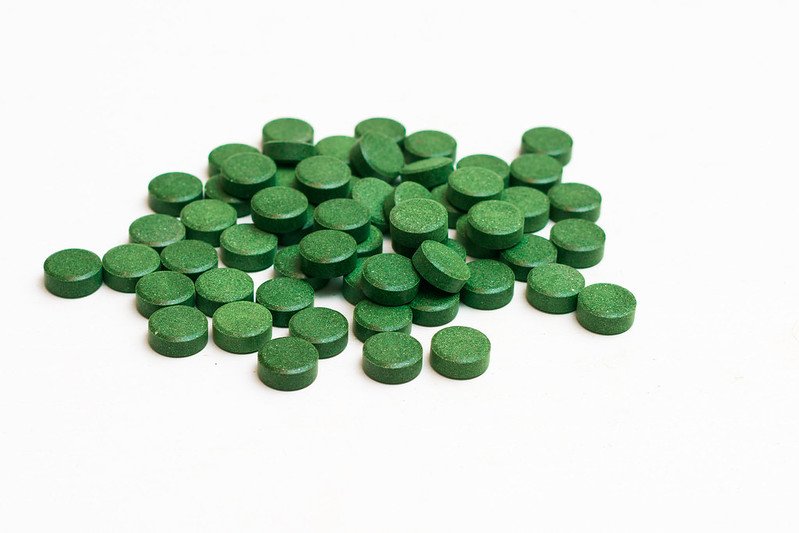
Chlorella, a single-celled green freshwater algae, is recognized for its detoxification properties and is available in two species, Chlorella vulgaris and Chlorella pyrenoidosa.
To benefit from its properties, it’s consumed as a supplement since the human body cannot digest its hard cell wall. Here’s how chlorella can support your kidney health:
- Heavy Metal Detoxification: Chlorella has shown promising results in animal studies for its ability to remove heavy metals and other harmful compounds from the body, including dioxin, a known hormone disruptor. This detoxifying effect may also contribute to kidney health by reducing the toxin load the kidneys need to process.
- Immune System Enhancement: Research suggests that chlorella can boost the immune system by increasing the activity of various immune components. A strong immune system is vital for maintaining overall health, including the kidneys.
- Safety and Dosage: Recognized as safe by the FDA, chlorella supplements should still be chosen with care due to potential side effects and variations in product quality. It’s crucial to select a supplement that has been third-party tested for quality assurance. The suggested daily dosage is typically 2-3 grams.
Here are some practical tips for incorporating chlorella into your routine for a kidney cleanse:
- Quality Matters: Look for supplements that carry a quality assurance seal to ensure you’re getting a product free of contaminants and consistent in dosage.
- Start Slow: If you’re new to using chlorella, begin with a small dose and monitor your body’s response before gradually increasing to the recommended amount.
While more research is needed to fully understand its effects on kidney detoxification, chlorella’s ability to remove toxins from the body may be beneficial in promoting kidney health.
5. Cilantro (Coriander)
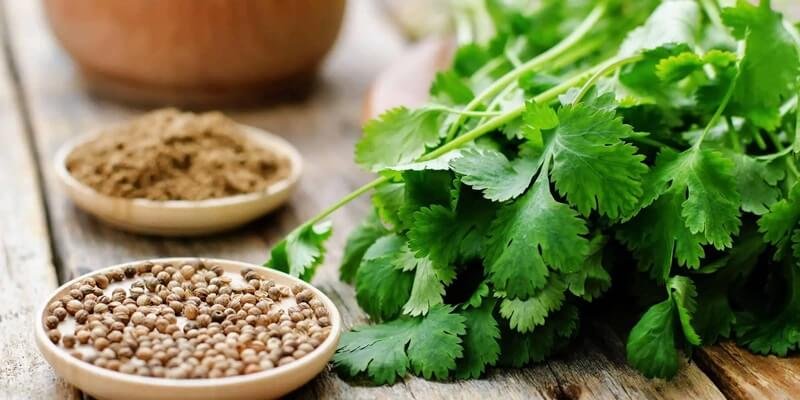
Cilantro, also known as coriander leaves, is not just a flavorful addition to your meals; it’s also one of the best herbs for kidney cleanse. Here’s what makes cilantro beneficial for your kidneys:
- Kidney and Urinary Tract Health: Drinking cilantro water can help cleanse your kidneys and urinary tract, and may even reduce the risk of kidney stones. This makes it a valuable herb if you’re exploring how to cleanse kidneys effectively.
- Rich in Nutrients: Cilantro is packed with antioxidants and essential vitamins. For those with kidney disease, it’s a great choice because it’s a low potassium and low phosphorus food, which is important to consider when managing kidney health.
- Suitable for Kidney Stones: If you’re concerned about calcium oxalate kidney stones, cilantro is considered a low oxalate food, which can be beneficial in your diet.
- Antioxidant Protection: Cilantro provides protective effects against chronic diseases thanks to its high content of vitamins, polyphenols, and antioxidants. Including cilantro in your diet supports your overall well-being and can be a sign that a kidney detox is working.
- Traditional Medicine: Known for its diuretic properties, cilantro has been used in traditional medicine to promote kidney health. It’s a natural choice for those seeking cleansing herbs as part of a herbal detox.
Here are some tips on how to incorporate cilantro into your diet for kidney health:
- Make Cilantro Water: You can create a simple cilantro infusion by adding fresh cilantro leaves to water, which can be a part of your daily routine and a step towards how to detox kidneys.
- Daily Servings: Aim to eat at least one serving of leafy green vegetables per day. Cilantro counts as one, and it’s an easy addition to salads, soups, and other dishes.
6. Basil
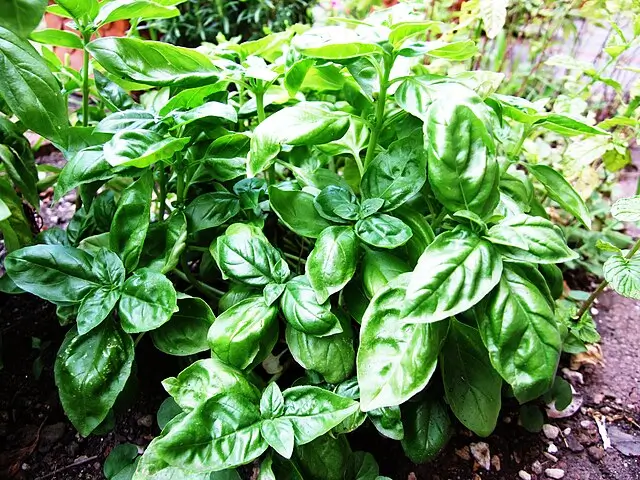
Basil, often celebrated in cooking for its robust flavor, also comes with a variety of health benefits that can support your kidneys.
Here’s how this fragrant herb can be a part of your best herbs for kidney cleanse:
- Antioxidant Properties: Basil is rich in antioxidants, which help protect your kidneys from damage. The phenolic components in basil leaves, such as flavonoids, phenolic acids, and rosmarinic acid, contribute to its strong antioxidative effect. These compounds combat oxidative stress, which is a key factor in maintaining kidney health.
- Ayurvedic Medicine: In Ayurvedic practices, basil has been used to improve kidney function and assist in the elimination of kidney stones. It’s believed that the herb’s natural compounds promote the organ’s health and help to flush your kidneys.
- Natural Stone Remover: For those wondering about how to cleanse kidneys, especially from kidney stones, basil could be a natural solution. It contains acetic acid, which helps to dissolve stones, and it’s suggested to lower uric acid levels, a common cause of kidney stones.
- Renoprotective Effects: A study has highlighted basil’s renoprotective effects, particularly against diabetes-induced renal issues. Basil significantly reduced creatinine and BUN levels, which are indicators of kidney function, in diabetic rats. This suggests that basil may have a protective role in kidney damage related to diabetes.
💡 TIP: Mixing fresh basil juice with honey is a traditional remedy to help eliminate stones via the urinary tract.
7. Cleavers (Galium aparine)
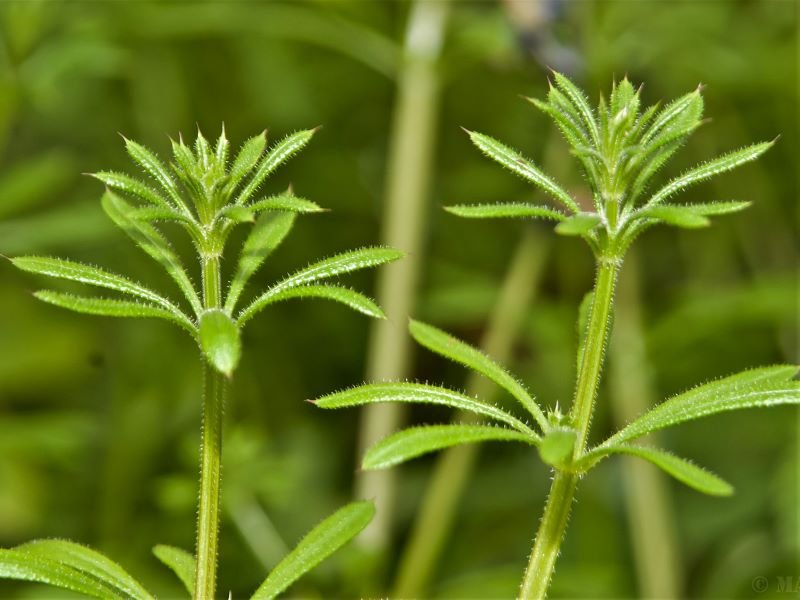
Cleavers aka scientifically as Galium aparinem is a herbaceous annual plant that is commonly found in Europe, North America, and Asia.
Cleavers have been traditionally used in herbal medicine for various purposes, including supporting kidney health.
It is believed that cleavers may have diuretic properties, meaning they can increase urine production and help flush out toxins and waste products from the kidneys.
The diuretic effect of cleavers is thought to be due to its high content of compounds called iridoid glycosides, which have been shown to have a mild diuretic effect in animal studies.
Additionally, cleavers may also have anti-inflammatory properties, which could potentially benefit the kidneys by reducing inflammation and promoting overall kidney health.
8. Turmeric
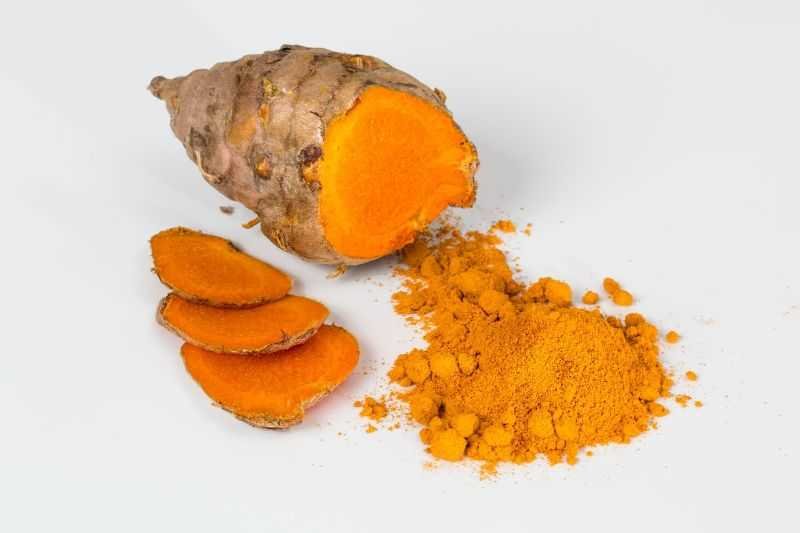
Turmeric is a spice celebrated not only for its role in culinary traditions but also for its potential health benefits, particularly when it comes to kidney health. Here’s what you should know about turmeric and how it can fit into your routine for a kidney cleanse:
- Curcumin’s Role: The active ingredient in turmeric is curcumin, which is responsible for the spice’s bright golden-orange color. Curcumin has been researched for its antioxidant and anti-inflammatory properties, which are believed to help reduce inflammation and protect the kidneys from oxidative stress.
- Benefits for Kidneys: Turmeric helps to cleanse out the kidneys, detoxify the liver, and purify the blood. It also works to prevent kidney inflammation and infections, making it a valuable addition to your list of best herbs for kidney cleanse.
- Traditional Use: For hundreds of years, turmeric has been used in cooking for its unique flavor and as a part of traditional medicine in China and India. Its long-standing use underscores the trust in its health-promoting qualities.
Here are some practical tips for incorporating turmeric into your kidney health regimen:
- Regular Inclusion in Meals: By adding turmeric to your recipes regularly, you can enjoy its potential health benefits. Whether you’re looking to learn how to detox kidneys or simply want to maintain kidney health, turmeric is an easy spice to include in your diet.
- Enhancing Absorption: Combining turmeric with black pepper in your meals can increase the absorption of curcumin, allowing you to better benefit from its properties. This simple culinary practice can make a significant difference in how your body utilizes the spice.
By understanding the properties of turmeric and how to incorporate it effectively, you can make this spice a supportive part of your approach to kidney health.
9. Hydrangea

Hydrangea root, often included in the best herbs for kidney cleanse, has a history of use in promoting kidney and bladder health. Its benefits for your urinary system include:
- Reducing Inflammation and Pain: If you’re experiencing discomfort in your urinary tract, hydrangea root may help reduce this due to its anti-inflammatory properties.
- Diuretic Effects: By increasing urine flow, hydrangea root can help prevent urinary tract infections and support detoxification, which is crucial when you’re looking into how to cleanse kidneys.
Bone and Joint Health: The anti-inflammatory properties of hydrangea root could aid in reducing joint pain and contribute to bone health. - Heart Health: Improved circulation and potential reductions in cholesterol levels and blood pressure are other areas where hydrangea root might benefit your heart.
It’s worth noting that while hydrangea root has traditionally been used for these purposes, human research is limited. However, some compounds found in hydrangea root, like coumarin and loganin, have shown anti-inflammatory and antioxidant properties in lab and animal studies.
10. Stinging Nettle for Kidney Cleanse
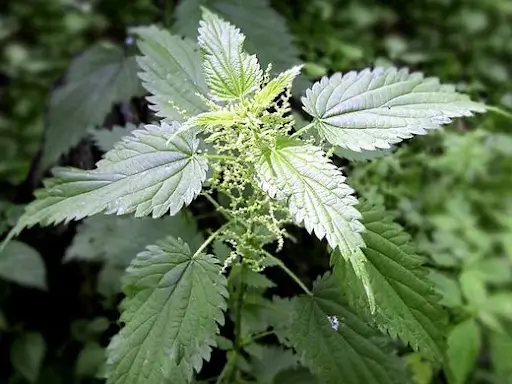
Stinging nettle is a plant that is known for its stinging hairs, which can cause a temporary stinging sensation and skin irritation when touched.
The use of stinging nettle for kidney cleanse involves consuming it as a tea, tincture, or supplement.
English (en)
Save
Stinging nettle (Urtica dioica) has been studied for its potential benefits on kidney health. Research has shown that stinging nettle has a protective effect against gentamicin-induced nephrotoxicity, a condition characterized by kidney damage caused by the antibiotic gentamicin. [6]
The nettle extract was found to increase glutathione levels and reduce malondialdehyde levels, indicating its antioxidant activity and ability to prevent oxidative stress in the kidneys.
Additionally, stinging nettle has been used in irrigation therapy for urinary tract health and prevention of kidney gravel, with positive results reported by both physicians and patients.
These findings suggest that stinging nettle may have a beneficial effect on kidney function and can potentially be used as a natural remedy for kidney-related conditions.
How to incorporate Kidney-Cleansing Herbs into Your Diet
Incorporating kidney-cleansing herbs into your diet doesn’t have to be complicated. Here are some straightforward ways to do it:
- Turmeric and Black Pepper: Start by adding turmeric to your meals regularly. To increase the absorption of turmeric’s beneficial compounds, combine it with a pinch of black pepper. This simple spice duo can boost the effectiveness of your best herbs for kidney cleanse.
- Nettle Tea: Stinging nettle is known for its high vitamin C content and diuretic properties, which can help filter out extra fluids through the kidneys. Drinking nettle tea is an easy way to enjoy these benefits. Make sure to consult your healthcare provider before starting any new herbal tea, especially if you have kidney damage.
- Rehmannia Supplement: Rehmannia is a herb used in Traditional Chinese Medicine known for its kidney-cleansing properties. Taking a rehmannia supplement can be beneficial for kidney health, but it’s important to follow the recommended dosage and consult with a healthcare provider.
2-Day Kidney Cleanse Plan
- Foods to Avoid: During a kidney cleanse, it’s vital to avoid foods that can put a strain on your kidneys. This includes milk, dairy products, meat, alcohol, table salt, refined sugar, gluten, soy, canned foods, processed and microwaved foods, artificial sweeteners, preservatives, and dyes. Eliminating these from your diet can help your kidneys to flush out toxins more effectively.
- Kidney-Friendly Foods: To further support your kidneys, add foods like pomegranate, avocado, tofu, fish, broccoli, squash, leafy greens, tomatoes, beans, strawberries, citrus fruits, apples, dairy alternatives, and whole grains to your diet. These foods are known to boost kidney function.
- Limit Unhealthy Choices: For ongoing kidney health, limit or avoid processed foods, soda, refined carbohydrates, sugar and artificial sweeteners, excessive animal protein intake, high-sodium foods, alcohol, and caffeine. Making these dietary changes can support your kidneys in the long term.
Sure, here’s the information in a table format:
| Meal | Description |
|---|---|
| Morning | Beetroot-cucumber-apple smoothie to energize and hydrate your body. |
| Lunch | Mixed green salad with grilled chicken or tofu, packed with kidney-friendly nutrients. |
| Snack | Blueberry-mango-kale smoothie, rich in antioxidants. |
| Dinner | Bowl of vegetable soup with kidney beans and a variety of veggies like sweet potato, carrots, and celery. |
Simple Tips For Maintaining Optimal Kidney Health
To maintain kidney health and support the best herbs for kidney cleanse, consider the following simple steps:
- Stay Hydrated: Drinking enough water aids your kidneys in toxin removal, keeps blood vessels healthy, prevents kidney stones and urinary tract infections, and ensures that your pee is light yellow or clear.
- Regular Health Checkups: Routine blood and urine tests can help monitor kidney function. Keeping an eye on your blood pressure and blood sugar levels is also crucial, as is maintaining a healthy weight.
- Diet and Lifestyle Choices: Limiting your intake of salt and protein can reduce strain on your kidneys, while regular exercise can boost overall health. Avoiding tobacco and excessive use of NSAIDs also goes a long way in preserving kidney function.
- Early Detection: Being proactive about kidney health is key. If kidney disease is caught early, medications can help manage blood pressure, reduce cholesterol, treat anemia, relieve swelling, and protect bones.
Conclusion
Throughout this article, we’ve highlighted various herbs renowned for their supportive roles in kidney health, from the diuretic properties of juniper berries to the protective effects of Rehmannia on kidney function.
Each botanical offers unique benefits, with a common focus on promoting the body’s natural detoxification processes and enhancing overall well-being.
before I close down this article it is crucial to understand the the importance of consulting a healthcare professional when incorporating any new herbal remedies into your health regimen, especially for those of you with existing medical conditions.
FAQs
The Lost Book of Herbal Remedies
You’ll find 800+ beneficial plants and remedies in “The Lost Book of Herbal Remedies“.
It includes recipes of tinctures, teas, decoctions, essential oils, syrups, salves, poultices, infusions and many other natural remedies that our grandparents used for centuries.
What’s also special about this book is that it has between 2 and 4 high definition, color pictures for each plant and detailed identification guidelines to make sure you’ve got the right plant.




